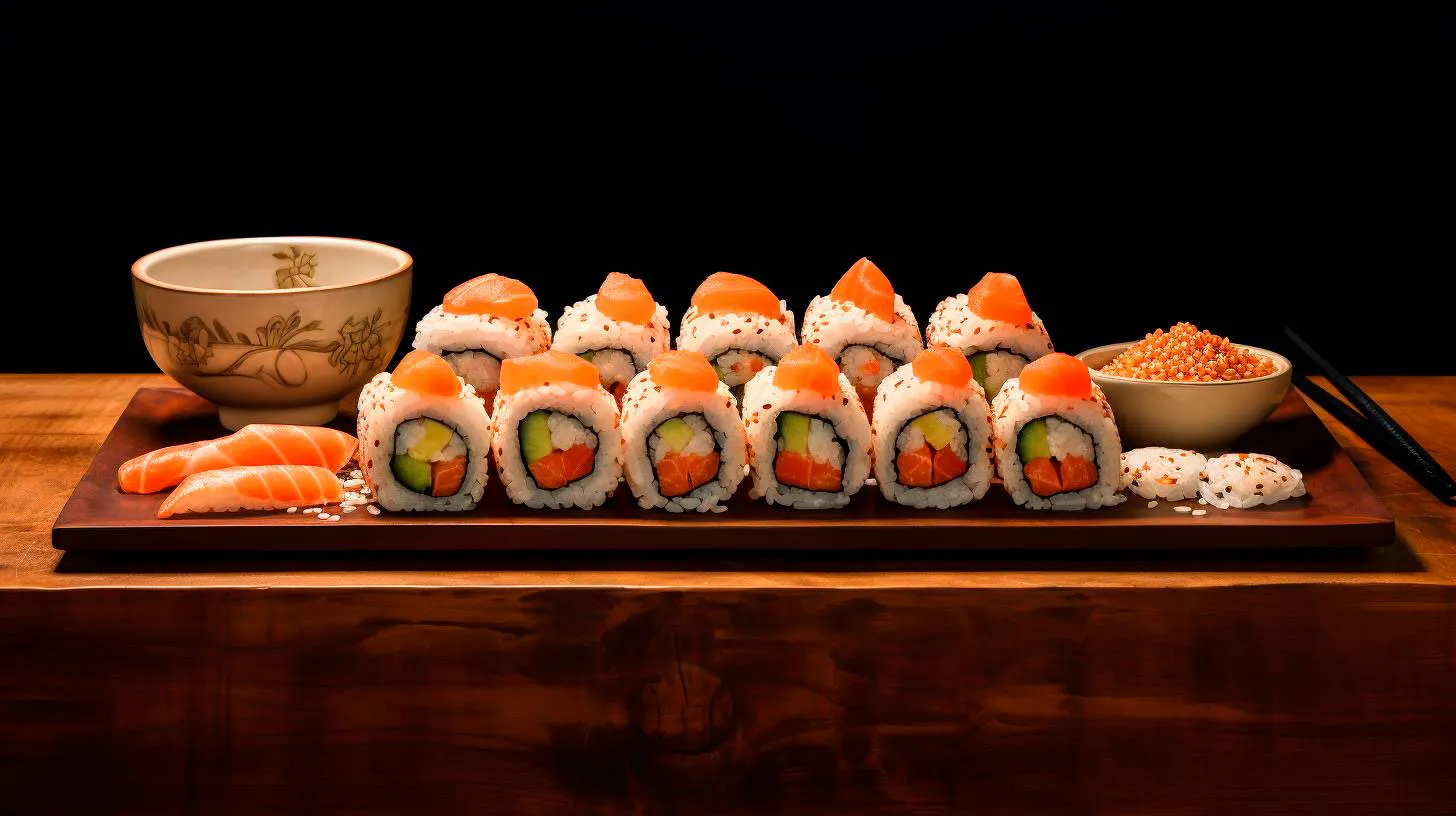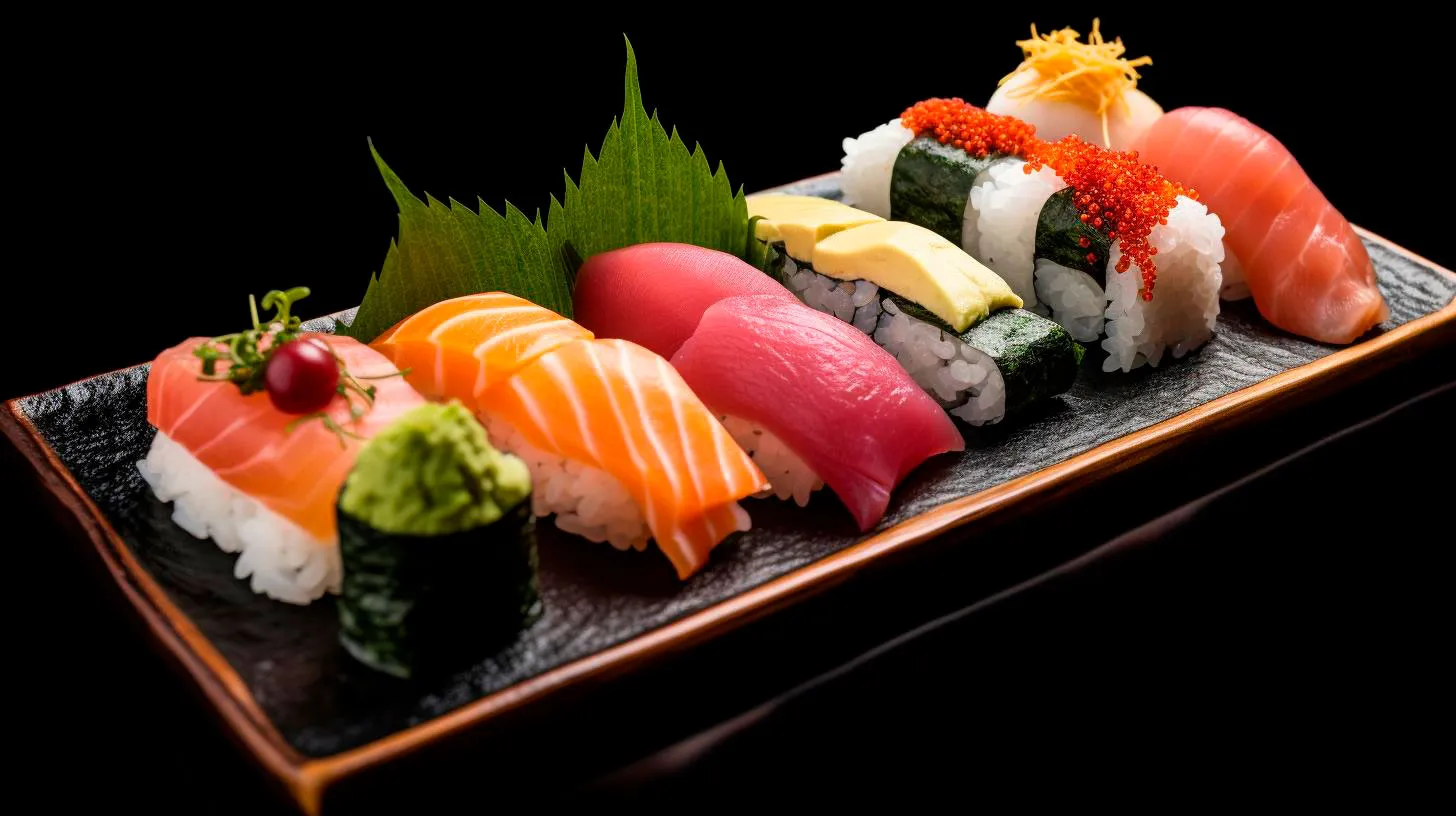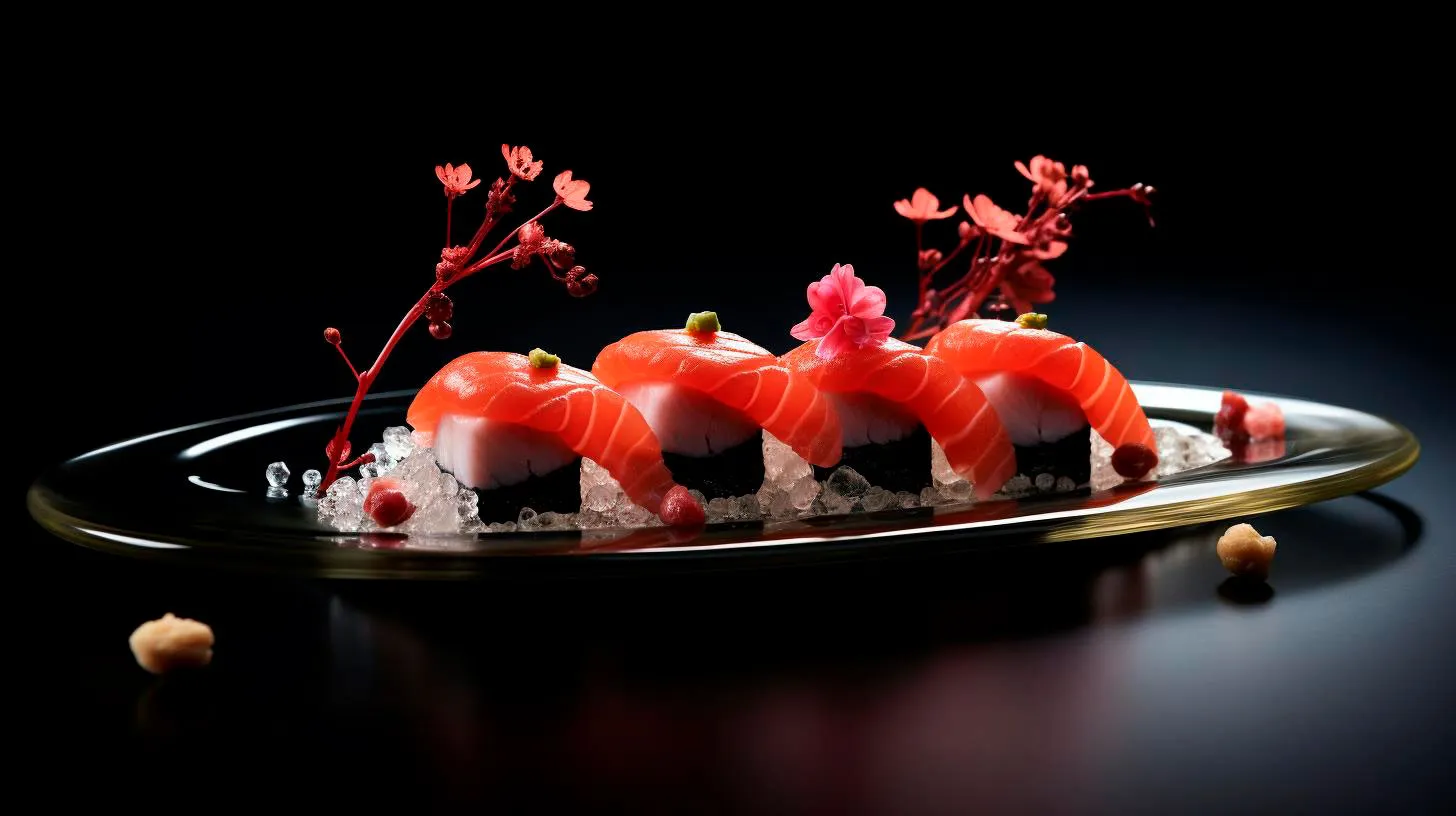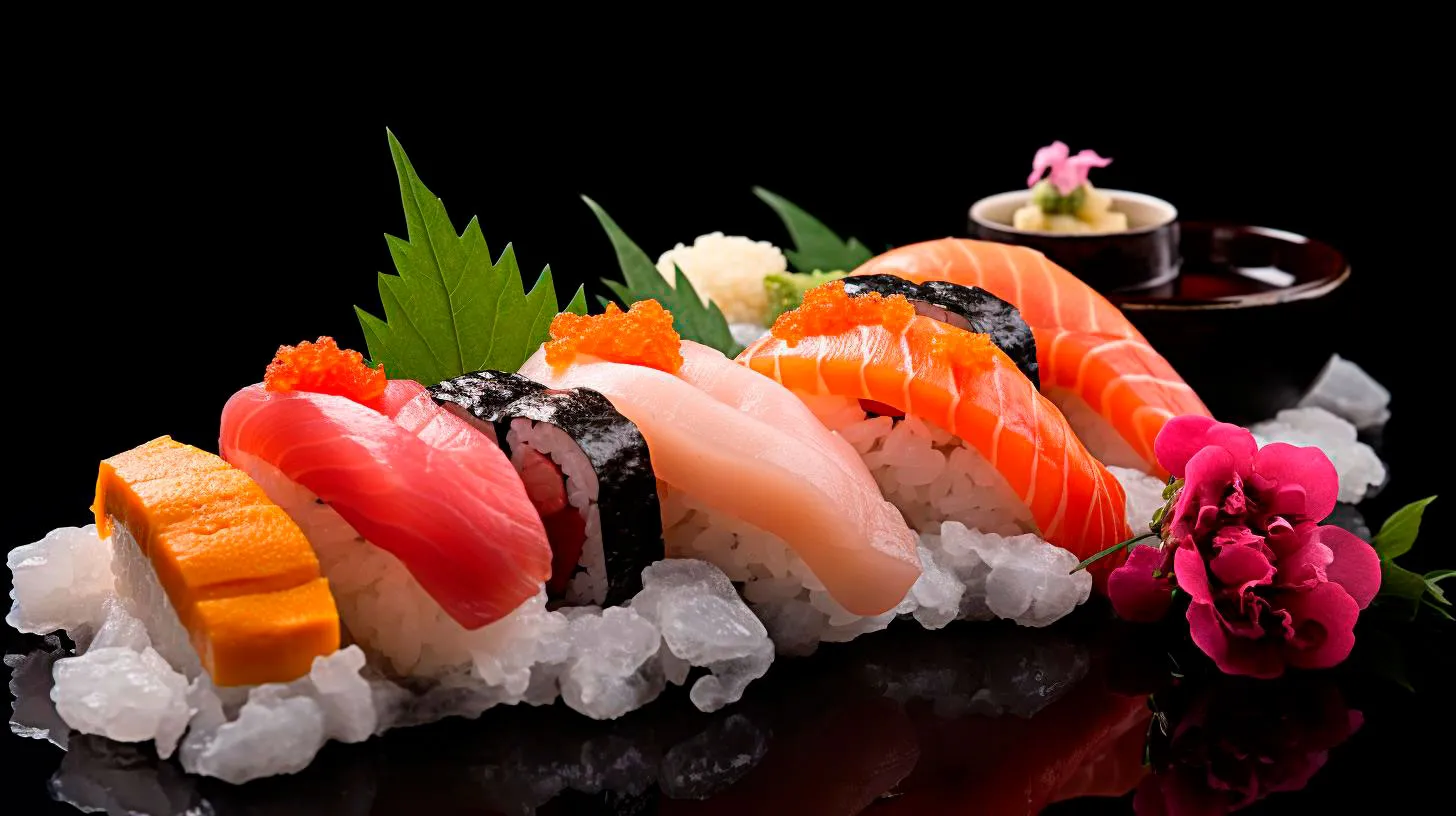Unleashing Creativity: How Culinary Schools Transform Sushi Making
In this article, we will explore how culinary schools transform the art of sushi making, allowing chefs to push boundaries, experiment with flavors, and master this iconic Japanese cuisine.
The Evolution of Sushi and Culinary Education
Sushi has come a long way from its humble origins in ancient Japan. What was once simple vinegared rice and fish has now evolved into a gourmet dish celebrated worldwide. As sushi’s popularity grew, culinary schools recognized the need to teach specialized techniques and skills to aspiring chefs looking to create sushi masterpieces.
With a curriculum designed to nurture talent and instill passion for Japanese cuisine, culinary schools provide aspiring chefs with the foundational knowledge and practical experience required to excel in the art of sushi making. Through hands-on training and expert guidance, culinary schools unlock the potential within every student, empowering them to unleash their creativity in the kitchen.
Key Features of Culinary School Sushi Programs
So, what sets culinary school sushi programs apart? Let’s explore some of the key features that make these programs essential for aspiring sushi chefs:
- Comprehensive Training: Culinary schools offer comprehensive training programs that cover everything from sushi history and culture to knife skills and fish selection. Students gain a deep understanding of the ingredients, techniques, and flavors essential to crafting exceptional sushi.
- Hands-on Experience: Sushi making is an art that requires practice and precision. Culinary schools provide ample opportunities for students to develop their skills through hands-on experience. From mastering the art of rice preparation to learning the delicate art of sushi rolling, students gain the practical knowledge necessary to excel in the industry.
- Exposure to Authentic Ingredients: To create authentic and flavorful sushi, knowing how to select the right ingredients is crucial. Culinary schools often source the freshest and highest quality seafood and ingredients, exposing students to a wide variety of flavors and textures. Understanding the nuances of ingredient sourcing allows chefs to create exceptional sushi experiences.
- Creative Freedom: Culinary schools encourage creativity and innovation. While traditional sushi-making techniques are taught, students are encouraged to experiment with flavors, textures, and presentations. This freedom allows aspiring chefs to develop their unique style and create distinctive sushi creations.
- Networking Opportunities: Culinary schools offer a rich environment for networking with instructors, fellow students, and industry professionals. These connections can open doors to internships, apprenticeships, and employment opportunities in prestigious sushi restaurants, providing invaluable career advancement opportunities.
- Business and Management Skills: Culinary schools understand that becoming a successful sushi chef involves more than just culinary skills. They provide students with essential business and management knowledge, teaching them how to run a successful sushi restaurant, manage costs, and build a loyal customer base.
Advantages of Attending Culinary School for Sushi Making
Are you still on the fence about attending culinary school to pursue a career in sushi making? Consider the following advantages:
- Industry-Relevant Skills: Culinary schools equip students with the skills and knowledge that directly translate to real-world scenarios in the culinary industry. From knife techniques to sushi presentation, attending culinary school ensures you are well-prepared for a successful career as a sushi chef.
- Professional Guidance: Culinary schools have experienced instructors who have mastered the intricacies of sushi making. They provide valuable guidance, mentorship, and feedback to help you refine your techniques and develop your own style.
- Credibility and Recognition: Graduating from a reputable culinary school adds credibility to your resume and increases your chances of securing employment at renowned sushi restaurants. Employers often prefer candidates who have obtained formal culinary education.
- Opportunities for Growth and Specialization: Specializing in sushi making can open doors to various career paths within the culinary industry. With a solid foundation from culinary school, you can explore opportunities in fine dining establishments, become a sushi consultant, or even open your sushi restaurant.
- Expanding Cultural Horizons: Attending culinary school allows you to immerse yourself in the rich culture and heritage of sushi making. You will gain a deep appreciation for Japanese culinary traditions, learn about the artistry behind sushi, and develop a global perspective on food.
- Stay Ahead of the Competition: The culinary industry is highly competitive, and attending culinary school gives you an edge over self-taught chefs. The comprehensive training and industry connections acquired in culinary school can give you a head start when it comes to securing sought-after positions in sushi restaurants.
Conclusion
Culinary schools play a vital role in transforming sushi making into an art form. Through their comprehensive training, hands-on experience, and emphasis on creativity, these schools empower aspiring chefs to unleash their culinary potential and create sushi masterpieces that are both visually stunning and delicious. Attending culinary school for sushi making provides numerous advantages, such as industry-relevant skills, professional guidance, and opportunities for growth.
If you have a passion for sushi and a desire to master the art of sushi making, enrolling in a culinary school with a robust sushi program can be the first step toward a successful and fulfilling career in this dynamic industry.
Training the Next Generation: How Culinary Schools Shape the Future of Sushi Artistry
Culinary schools play a crucial role in shaping the future of sushi artistry by providing aspiring chefs with the knowledge and techniques needed to excel in this ancient art form. In this blog article, we will explore how culinary schools are instrumental in training the next generation of sushi chefs, the advantages of pursuing formal culinary education, and the key takeaways for aspiring sushi artists.
The Role of Culinary Schools in Sushi Artistry
Culinary schools serve as a vital platform for aspiring sushi chefs to refine their skills and deepen their understanding of the art of sushi making. These schools offer specialized programs that provide a comprehensive curriculum covering everything from sushi history to knife skills and ingredient selection. Moreover, culinary schools offer hands-on training in authentic sushi preparation techniques, ensuring students gain practical experience in creating a wide variety of sushi dishes.
Key benefits of culinary schools for sushi artistry include:
- Expert Guidance: Culinary schools are staffed with experienced sushi chefs who can provide valuable insights and mentorship. Their expertise allows students to learn from the very best in the industry.
- Networking Opportunities: Through culinary schools, aspiring sushi chefs can connect with a network of professionals, including instructors, peers, and industry experts. These connections can open doors to employment opportunities and collaborations.
- Specialized Training: Culinary schools offer specialized courses focusing solely on sushi making, ensuring that students receive comprehensive training tailored to the specific requirements of the art form.
The Advantages of Pursuing Culinary Education
Formal culinary education offers numerous advantages for individuals aspiring to become sushi artists. Here are some key advantages:
- Foundation of Skills: Culinary schools provide a solid foundation in basic culinary skills, such as knife handling, food safety practices, and flavor pairings. These fundamental skills are crucial for mastering the art of sushi making.
- Exposure to New Techniques: Culinary schools expose students to a wide range of sushi styles and techniques from different regions. This exposure allows aspiring chefs to develop a diverse skill set and become versatile in their craft.
- Industry Insights: Through culinary education, students gain a deeper understanding of the industry trends, customer preferences, and sustainability practices, enabling them to stay ahead of the curve in this competitive field.
- Credibility and Job Opportunities: Graduating from a reputable culinary school enhances an aspiring sushi chef’s credibility and increases job prospects. Many renowned sushi restaurants prefer hiring chefs with formal culinary education due to their extensive training.
Key Takeaways for Aspiring Sushi Artists
Aspiring sushi artists should consider the following key takeaways when deciding to pursue a culinary education:
- Passion and Dedication: The art of sushi making requires immense passion and dedication. Pursuing formal culinary education showcases a commitment to honing one’s craft and improving culinary skills.
- Learning from the Masters: Culinary schools provide aspirants with the opportunity to learn from experienced sushi chefs who have mastered the art form. This mentorship can significantly accelerate skill development.
- Broadening Culinary Horizons: Learning in a diverse culinary environment exposes aspiring sushi chefs to new flavors, ingredients, and techniques, enabling them to create unique and innovative sushi dishes.
- Industry Relevance: Culinary education keeps aspiring sushi chefs up-to-date with the latest industry trends, sustainable practices, and emerging techniques, positioning them as knowledgeable professionals in an ever-evolving culinary landscape.
In conclusion, culinary schools play a vital role in shaping the future of sushi artistry. By offering specialized training, expert guidance, and a network of industry professionals, these institutions provide aspiring sushi chefs with the necessary foundation and skills to excel in this ancient culinary art. Pursuing formal culinary education not only enhances chefs’ credibility but also exposes them to new techniques, industry insights, and job opportunities. So, if you are an aspiring sushi artist, consider the advantages of culinary education and embark on a journey that will shape your future in sushi artistry!
The Evolution of Sushi: How Culinary Schools Are Raising the Bar
The Rise of Sushi
Sushi, which means “sour-tasting” in Japanese, was first developed as a method of preserving fish by fermenting it with rice. Over time, it gradually transformed into the delicious delicacy we know today. Initially, sushi was sold by street vendors in Japan, but its popularity quickly spread, and sushi restaurants started popping up all over the world.
With globalization, sushi gained international recognition and found its way onto menus in various countries. In the early days, sushi was primarily enjoyed by the Japanese diaspora. However, as the food industry evolved and cultural boundaries blurred, sushi became mainstream, appealing to people of all backgrounds.
As a result, more culinary enthusiasts became intrigued by the art of sushi-making and set out to learn the skills necessary to create these delectable bites. This growing interest has paved the way for culinary schools to play a significant role in the evolution of sushi.
The Role of Culinary Schools
Culinary schools have become a driving force behind the elevation and refinement of sushi. These institutions offer specialized programs and courses that teach aspiring chefs the techniques and traditions of sushi-making. As students master the fundamentals, they are encouraged to experiment and put their unique spin on traditional recipes.
The influence of culinary schools is twofold: they provide individuals with the opportunity to learn and practice sushi-making under the guidance of experienced instructors, and they also contribute to the development of innovative sushi recipes that push the boundaries of the cuisine.
Key takeaways from sushi culinary schools include:
- Mastering the art of sushi rice preparation: Culinary schools teach students the precise measurements and techniques required to achieve the perfect balance of seasoning in sushi rice.
- Knife skills: One of the most crucial aspects of sushi-making is the precision and dexterity required when handling a knife. Proper knife skills are taught and emphasized in culinary schools.
- Seafood selection: Choosing the right quality and freshest seafood is paramount in sushi preparation. Students learn how to identify and select the best fish available while paying close attention to sustainability practices.
- Exploring contemporary sushi trends: Culinary schools encourage students to experiment with new flavors and techniques to create unique and innovative sushi rolls, combining traditional elements with modern twists.
The Impact on Sushi Culture
The contributions of culinary schools extend beyond the walls of the classroom. With the knowledge gained from these institutions, aspiring chefs are driving the evolution of sushi and shaping its future.
Sushi is no longer limited to traditional ingredients and flavor profiles. Chefs who have trained in culinary schools are bringing their creative flair and diverse culinary backgrounds to sushi preparation. This infusion of innovation has led to fusion sushi, where elements from different cuisines are incorporated into traditional sushi recipes. This trend has brought a new wave of excitement to the sushi scene and expanded its appeal to a broader range of palates.
Additionally, as sushi continues to gain popularity and acceptance worldwide, culinary schools are playing a vital role in preserving and promoting traditional Japanese culinary techniques. By incorporating sushi-making into their curriculums, these institutions are ensuring that the art of sushi-making is passed down to future generations.
By embracing the evolution of sushi and fostering creativity, culinary schools are driving the advancement of the cuisine, further establishing sushi as a global culinary masterpiece.
Conclusion
The evolution of sushi is a testament to the power of culinary schools in shaping the culinary landscape. Aspiring chefs who attend these institutions not only learn the skills necessary to become masters of sushi-making but also contribute to the ongoing innovation and fusion within the culinary world.
As sushi continues to evolve, culinary schools are raising the bar by promoting creativity, experimentation, and a deeper understanding of the cultural and historical significance of this iconic cuisine. Through their dedication and passion for sushi, culinary schools are ensuring that sushi remains a cherished culinary tradition for generations to come.
From Tradition to Masterpiece: How Culinary Schools Impact Sushi Artistry
Yet, despite its long-standing history, sushi continues to evolve, and much of this transformation is credited to the influence of culinary schools on sushi artistry.
The Rise of Culinary Schools
In recent years, culinary schools focused on traditional Japanese cuisine have gained tremendous popularity. These institutions have opened up new avenues for aspiring sushi chefs to acquire the necessary skills and knowledge to embrace the art form. With the demand for authentic sushi experiences rising globally, culinary schools have stepped up to meet the growing industry needs.
Nowadays, culinary schools offer comprehensive programs in sushi making, ranging from foundation courses to specialized ones. These programs impart essential techniques, educate students about various sushi variations, provide hands-on experience, and instill an appreciation for the history and cultural significance of this beloved Japanese delicacy.
Advantages of Culinary Schools in Sushi Artistry
Enrolling in a culinary school specializing in sushi artistry offers several advantages for aspiring sushi chefs and the industry as a whole:
- Technical Mastery: Culinary schools provide a structured learning environment where students can master the fundamental techniques, such as rice preparation, fish slicing, and sushi rolling. This emphasis on technical proficiency ensures that chefs produce consistent and high-quality sushi.
- Exposure to Traditional and Modern Techniques: Sushi artistry is a dynamic domain, combining traditional methods with modern innovations. Culinary schools expose students to both the tried-and-true techniques passed down through generations and the latest trends shaping the sushi culinary landscape.
- Understanding Flavor and Balance: A key aspect of sushi artistry lies in achieving the perfect balance of flavors. Culinary schools educate students about the importance of combining various ingredients and seasoning to create a harmonious taste profile.
- Knowledge of Sourcing and Sustainability: With seafood being a vital component of sushi, culinary schools teach students about responsible sourcing practices, encouraging awareness of sustainability and the impact on marine ecosystems.
- Menu Innovation: Culinary schools not only focus on preserving tradition but also encourage chefs to experiment and innovate. This results in the creation of exciting and unique sushi variations that cater to evolving palates.
The Key Takeaways
Aspiring sushi chefs who choose to pursue their passion through culinary schools gain a comprehensive understanding of the artistry and techniques involved in creating exquisite sushi. This offers them a strong foundation to excel in the industry. Additionally, the impact of culinary schools on sushi artistry extends beyond individual chefs:
- Industry Growth: The influence of culinary schools has contributed to the growth of the sushi industry as a whole. With trained chefs bringing their expertise to kitchens around the world, sushi restaurants have witnessed a rise in demand, leading to increased opportunities and market expansion.
- Preservation of Tradition: By teaching traditional techniques and emphasizing the importance of cultural aspects, culinary schools play a significant role in preserving the authenticity of sushi. This ensures that the artistry continues to be celebrated and respected in its truest form.
- Culinary Cross-Pollination: Culinary schools often attract students from diverse backgrounds, creating a melting pot of ideas and influences. This cross-pollination of culinary knowledge leads to unique collaborations and fusion concepts, revitalizing sushi artistry with fresh perspectives.
In conclusion, culinary schools have become pivotal in shaping the artistry of sushi. They bridge the gap between tradition and innovation, equipping aspiring chefs with the expertise needed to create sushi masterpieces that not only honor the roots of Japanese cuisine but also cater to evolving tastes worldwide. The impact of culinary schools extends beyond the classroom, driving industry growth, preserving tradition, and fostering culinary creativity. As sushi continues to captivate our senses, the influence of culinary schools ensures that this ancient culinary art form remains dynamic and relevant in the modern world.



